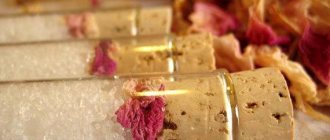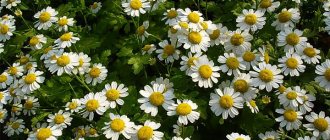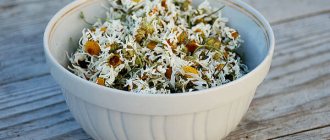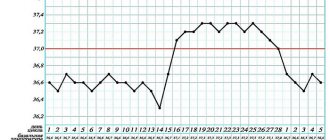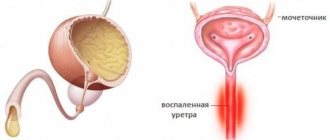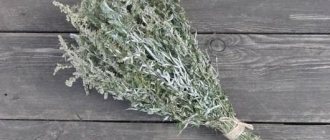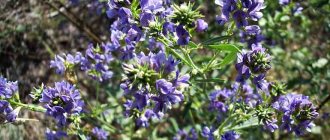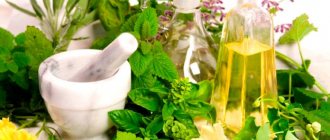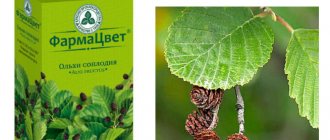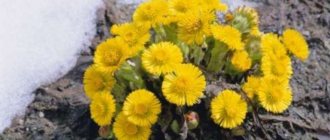Soothing herbs: indications for use and effectiveness
Nervous disorders, neuroses, depression, stress - constant companions of modern man - do not at all add bright colors to his life. Some people literally live on antidepressants, endlessly take sedatives, trying, if not to restore the normal functioning of the nervous system, then at least to alleviate the negative manifestations of its malfunctions.
Positive properties of calming herbs
It is worth paying attention to plants that have a sedative effect on the human psyche.
The beneficial qualities of calming herbs include:
- decrease in aggressiveness and tearful state,
- strengthening the process of slowing down nervous reactions,
- slows down the heartbeat, has a beneficial effect on the autonomic nervous system,
- removal of the excited state,
- combating insomnia, normalizing sleep.
Important! Try to monitor the intake of sedative herbs and infusions, do not take them uncontrolled.
Calming herbs or medications?
The choice, of course, is up to the sufferer himself. The faster effect of the tablets speaks volumes in their favor. But, having read in the instructions about various side effects and contraindications, a sane person will choose soothing teas that not only calm the nerves, but also have a positive effect on the body as a whole, and are practically safe.
One minus: sedative herbs for the nervous system of an adult, and a child too, need to be taken for a long time before the result appears. On the other hand, the pills can become addictive if they are taken for a long time, and they simply stop working, and the dose will have to be adjusted upward, and this is already fraught.
Soothing herbal tea can compete with pills not only because of addiction, but also in the following indicators:
- it, as already mentioned, is safe for health;
- herbs, unlike antidepressants, do not harm the liver;
- soothing tea tastes good and can be consumed instead of the usual black tea;
- medications are aimed only at the “nervous component,” while herbal infusions are “multifunctional”: they can be used to make compresses, inhalations, or add to bath water;
- An important point: natural soothing herbal mixtures for the nervous system of an adult are much more affordable.
Herbs for fear
An obsessive feeling of fear that occurs without a clearly defined reason has a negative impact on mental balance and can also undermine health if effective methods are not turned to in a timely manner. On the advice of experts, many medicinal plants help alleviate the uncomplicated state of fear.
- Zamanikha
Finely chop the washed fresh roots of the plant. In a glass bottle, combine them with alcohol (70%), maintaining a ratio of 1:10.
Infused for 14 days and filtered, 35 drops of elixir are taken before breakfast, lunch, and dinner.
- Chamomile aster
Dried, crushed inflorescences of aster chamomile (Italian) - 1 tbsp. The spoon is infused until it cools in 200 ml of boiled water. 20 ml of healing liquid squeezed out through a double bandage is drunk every six hours.
- Ginseng
Crushed dried ginseng rhizomes in a ratio of 1:10 are poured into a glass vessel with alcohol (60%).
After two weeks of exposure in dark conditions, the filtered tincture, 15-20 drops, is taken every eight hours.
Article for you:
How to treat swelling with diuretic herbs at home
How do herbs act on the body?
Calming teas can relieve aggression, suppress irritability, relieve arrhythmic manifestations, improve sleep, and also remove or minimize unpleasant side effects such as heavy sweating and trembling of the limbs.
Soothing teas are most often created on the basis of medicinal herbs known to folk medicine:
- black cinnamon,
- valerian,
- oregano;
- St. John's wort,
- fireweed (fireweed),
- Icelandic moss,
- linden trees,
- lemon balm,
- mint,
- passion flowers,
- wormwood,
- motherwort,
- thyme and many others.
Almost each of these plants can not only calm frayed nerves. For example, valerian, in addition to being able to cope with anxiety, relieves spasms, is an excellent choleretic agent, and also helps to normalize the functions of the circulatory system, in particular, “pacifies” the heart rate.
IMPORTANT! It is necessary to accurately maintain the specified dosage, otherwise the medicinal herb may have the opposite effect, and the patient will, on the contrary, become excited, nervous and even aggressive.
Melissa is no less generous: in addition to the already indicated actions inherent in valerian, it relieves itching, reduces temperature, regulates the functioning of the gastrointestinal tract, and the function of the sex glands.
Peony is an anticonvulsant, in addition to its sedative effect.
Chamomile is also recommended for diarrhea.
Action and benefits
Experts characterize the effect of chamomile as medium in strength. It cannot replace sedatives if there is a reason to take them or be used as the main component of therapy. You should resort to chamomile infusion during one-time episodes of stress and anxiety, when obsessive thoughts arise, or during emotional turmoil. The drug is also appropriate as one of the components in complex therapy against insomnia and other disorders not associated with serious pathologies.
To enhance the effect of chamomile, it is combined with other herbs: lemon balm and mint. Some herbs are stronger: St. John's wort, valerian, Ivan tea, thyme.
In its pure form, chamomile decoction or infusion has the following mild properties:
- sedative;
- antihistamine;
- anti-inflammatory;
- antibacterial;
- diuretic and choleretic;
- antispasmodic.
With regular use, the immune system is strengthened, which is especially important in winter, when the risk of catching colds and flu increases. Your doctor may also recommend chamomile as an aid for:
- digestive disorders, gastrointestinal diseases;
- cold;
- migraine;
- cystitis;
- diabetes mellitus;
- toothache;
- depressed emotional state.
What are the indications for use?
Soothing herbal tea is used for a wide variety of conditions:
- severe irritability;
- aggressiveness and anger towards others;
- inability to relax due to nervous itching or frequent pain;
- prolonged insomnia;
- uncontrolled emotional behavior.
Soothing herbal tinctures for the adult nervous system are suitable for both men and women.
Making the drink is easy. You just need to brew the herb with boiling water and let it sit for a while. Then the decoction is filtered and taken according to medical advice.
Herbs for pregnant women...
Not all herbs are indicated for the expectant mother to calm her nerves, therefore, to avoid unpleasant consequences and complications, you should consult a gynecologist.
So, there are several plants that are prohibited to take during pregnancy. This applies in particular to oregano. Some experts also call lemon balm, but opinions differ on this matter. But valerian, mint and chamomile, brewed like tea, are harmless to expectant mothers.
- Valerian root can be brewed either “alone” or in “company” with chamomile and fennel. The decoction should be drunk in the morning and evening - half a glass.
- Melissa and mint help a pregnant woman cope with stressful situations. A teaspoon of herb is brewed with a cup/glass of boiled water. (By the way, experts advise not to steep mint for long).
- Motherwort is brewed a little differently: 3 tbsp. l. herbs per glass of boiling water. Leave for a quarter of an hour. Dosage regimen: take a tablespoon 30 minutes before meals.
Keep in mind: this remedy is contraindicated for low blood pressure!
...and children
If there is a need for a child to take soothing herbal tea, it is imperative to consult with a pediatrician about which herbs, in what dosage and at what age can be consumed.
In general, herbs are recommended for restless children for their bathing. For this purpose the following are applicable:
- valerian,
- calendula,
- mint,
- plantain,
- motherwort,
- chamomile,
- thyme.
Before bathing, three or four tablespoons of the selected herb should be brewed with boiling water and allowed to brew for 40–50 minutes. The broth is filtered and added to the bath.
The best herbs for nerves and their recipes
Chamomile
Chamomile has been one of the most popular medicinal herbs since ancient times; it is widespread in Russia and is available both for self-collection and for purchase at a pharmacy.
Chamomile flowers are used to prepare teas, infusions and decoctions that have a mild calming effect.
To prepare tea, you need to pour five to ten grams of flowers with one glass of boiling water and wait about twenty minutes. If you drink this tea at night, your sleep will be sound, calm and healthy.
The chamomile infusion is prepared similarly to tea, but infused a little longer, up to half an hour, with the lid closed and wrapped in a blanket or covered with a heating pad for brewing tea.
If you drink half a glass of chamomile infusion three times a day before meals, it will be easier for the body to fight overwork, which leads to chronic fatigue.
A chamomile decoction, cooked over a fire from two hundred grams of flowers and two liters of water for ten minutes and kept for two hours, will be an excellent component of a warm bath that will help you calm down and get a good night's sleep. It is advisable to do baths within two weeks.
Hawthorn
Hawthorn - trees and shrubs whose fruits, flowers and leaves are useful for relieving nervous excitement.
An infusion and tincture are prepared from hawthorn.
The infusion is prepared from two tablespoons of dry pounded fruits per 300 ml of boiling water and taken three times a day before meals.
To prepare the tincture, you need to pour a tablespoon of raw material into a glass of vodka and leave for 7 days, then drink 20-25 drops with water 3-4 times a day.
Motherwort
Motherwort has a strong sedative effect, several times greater than the effect of valerian, and is widely used to treat increased excitability.
To calm down, drink motherwort juice three times a day before meals, thirty to forty drops of which are pre-diluted with one tablespoon of water.
It will also be useful to drink an infusion or tincture of motherwort.
The motherwort infusion takes about eight hours to prepare. To do this, pour one tablespoon of medicinal herb into 200 ml of hot boiled water and put it in a dark place. The finished infusion should be drunk three or four times a day before meals, a tablespoon at a time.
You can buy an alcoholic tincture of motherwort at a pharmacy or prepare it yourself.
Homemade tincture is prepared very simply: one part of the herb is poured into five parts of 70% alcohol and infused for about a week. You need to drink this tincture, half a teaspoon diluted in one tablespoon of water, three times a day, also before meals.
Black algae
For depression and neuroses, an infusion is used, which is prepared from a mixture of 20 g of St. John's wort flowers, 20 g of black thyme herb, 10 g of rosemary and 5 g of lavender.
The mixture is poured with a glass of boiling water, left for one hour, filtered and taken 60 ml three times a day.
A good sedative effect is provided by an alcohol tincture of black thyme: crushed dry grass (15-30 g) is poured with half a liter of vodka and infused for two weeks.
The tincture is taken 30 drops, diluted in a quarter glass of water, twice a day.
St. John's wort
The healing properties of St. John's wort were known in Rus', where it was called “a cure for 99 diseases” or “God’s herb.”
St. John's wort has a sedative effect and is effective in combating stress, sleep disorders, and depression.
To prepare the infusion, you need to pour three grams of raw material with half a glass of boiling water and leave under the lid closed for a quarter of an hour.
After this, the infusion is filtered and brought up to one hundred milliliters with slightly warmed water.
When preparing a decoction of St. John's wort, you need to prepare a water bath and place one tablespoon of the raw material in it, filled with a liter of water, for a quarter or a third of an hour. Afterwards, the broth is removed from the bath, left to brew, then filtered.
Take the infusion and decoction the same way: drink half a glass about half an hour before meals in the morning and evening.
Lavender
The healing properties of lavender were known to the ancient Greeks, Egyptians and Romans long before our era; lavender was also used in Rus'.
In case of constant stress, in order to prevent neuroses and depression, drink warm lavender tea at night: to prepare, take two teaspoons (or one tablespoon) of dry lavender and pour a glass of boiling water.
The tea will be ready in 10 minutes; if desired, you can add a spoonful of honey to it.
You can also prepare an infusion of three teaspoons of raw materials in two glasses of hot boiled water. The infusion is kept for about half an hour, after which they drink a quarter glass four times a day.
In addition, lavender infusion can be added to the bath.
Slightly less popular is lavender tincture with alcohol, the dosage of which is selected by the doctor. You can buy the tincture ready-made or prepare it yourself: one part of the herb is poured with five parts of vodka and infused for a week, after which it is filtered.
Melissa
Melissa is used as a sedative for increased excitability, insomnia, and hysteria.
To prepare a decoction, you need to pour one tablespoon of dry herb into 200 ml of boiling water and simmer for a quarter of an hour in a water bath.
The decoction obtained after filtering is brought to the original volume with boiled water and drunk an hour after meals three times a day, half a glass. The course of taking the decoction is designed for no more than a month.
It is quicker and easier to prepare an infusion of lemon balm: infuse the same amount of herbs and water under a closed lid for about ten minutes and drink two-thirds of a glass after dinner and immediately before bed.
An alcohol tincture is also prepared from lemon balm: one part of the herb is poured with three parts of vodka and left in a dark place for a week, after which it is taken three times a day with water (1-2 teaspoons of tincture per third glass of water).
Melissa juice, taken 40-60 drops with one spoon of honey and milk up to six times a day, is a good remedy for overwork.
Valerian
Valerian is rightfully considered a classic remedy for nerves and stress.
Decoctions and infusions (both water and alcohol) are used from valerian root.
To cope with lack of sleep due to stress, it is recommended to take baths with a decoction prepared from thirty grams of valerian root.
The raw materials need to be poured with cold water, then brought to a boil, kept at moderate boiling for about 20 minutes, then turn off the heat and leave to brew for another five minutes. The strained solution is added to the bath, which is taken before bed for two weeks.
An aqueous infusion of valerian is prepared from 5-10 g of raw materials and 300 ml of hot boiled water and infused for about three hours. This infusion is drunk half a glass three times a day.
An alcohol tincture is prepared from one part of the medicinal raw material and five parts of alcohol, which are placed in a dark place and left there for ten days. The tincture is taken 20-30 drops before meals three times a day.
Mint
As a sedative, mint is used in the form of tea (both in pure form and as an additive to tea leaves) and decoction.
It is useful to drink herbal tea in the evening, before going to bed. A teaspoon of dried herb or about five leaves of fresh mint is poured into a glass of boiled water and infused for about half an hour, after which the healing drink is ready for use.
The recipe for the decoction is also quite simple: two tablespoons of dry mint or ten leaves of fresh mint are poured into two glasses of boiling water and simmered over low heat for about five minutes, after which the resulting decoction is cooled and filtered.
Ginseng
Ginseng roots have been a popular component of Eastern medicine since ancient times.
For neuroses, mental and physical stress, ginseng is used mainly in the form of a tincture, for the preparation of which you need to infuse 10-15 g of ginseng root in half a liter of vodka for 10-20 days, then filter.
The tincture is taken 10-20 drops 1-2 times a day for a month.
Chinese medicine also recommends another recipe: pour 40-50 grams of root with half a liter of vodka, leave for 24 hours. Then heat the mixture to 50 degrees, shake and leave to infuse for another week. This tincture is used one glass 3 times a day before meals.
Eleutherococcus
Eleutherococcus is a shrubby plant with healing effects similar to ginseng, but much cheaper and therefore more widespread in our country.
Liquid extract of Eleutherococcus is taken orally half an hour before meals. The dosage for adults is 20-40 drops three times a day for one month, and for children - one drop for one year of life.
Eleutherococcus tincture is taken after meals. The dosage is selected depending on the purpose of use: 20-30 drops twice a day for prevention and 30 drops up to three times a day for treatment.
The course of taking the tincture ranges from two weeks to a month.
To prepare your own tincture, you need to pour 100 g of dry root with half a liter of vodka and leave for three weeks in a dark place. In this case, every two to three days it is necessary to shake the tincture.
After the tincture is ready, you need to strain it and store it in a dark place.
Hop
For medicinal purposes, hop cones are used, from which a good decoction is obtained, effective for relieving nervous excitement: ten grams of cones are poured with a glass of boiling water, brought to a boil and left on low heat for twenty minutes.
After preparation, the broth is cooled, filtered and drunk three times a day, one tablespoon.
You can also try taking half a teaspoon of hops powder three times a day.
Oregano
Oregano is a perennial plant widely used in medicine, the simplest folk remedies from which are used for increased excitability and insomnia.
Most often, an infusion of oregano is taken, for the preparation of which one teaspoon of the herb is brewed with a glass of boiling water and left for two hours.
The strained infusion is taken 1 tablespoon 3-4 times a day half an hour before meals.
An alcoholic tincture of oregano is prepared at the rate of 10 g of herb per 150 ml of 70% ethyl alcohol.
The mixture is infused for 710 days in a dark place at room temperature, and 30–40 drops are taken 3–4 times a day.
What effect does tea have?
Not everyone knows that the bioactive agent that is tea can also calm the nervous system. Yes, tea
green
normalizes the functioning of this very nervous system, regulates blood pressure, improves sleep. But for this you need to know: in order for green tea to have a calming effect, it should be steeped for no longer than five minutes. An extra two to four minutes will deprive it of essential oils, which have a beneficial effect on the nervous system.
NOTE
The calming properties of green tea are enhanced when mixed with lemon balm and mint.
…black
Everyone knows that regular black tea is a tonic drink. However, there are a couple of secrets that will make it calming:
- do not steep it for a long time: weakly brewed tea does not excite – quite the opposite;
- brew it with mint and lemon balm, add milk;
- A couple of spoons of honey “as a bite” with black tea will help you fall asleep easily and quite serenely.
…white
Among the many ailments that white tea can fight are stress, bad mood and insomnia. And all because among all teas it ranks first in terms of low caffeine content. This relaxing tea does not cause insomnia and can be enjoyed calmly in the evening. But you also need to know how to cook it.
It is recommended to take high-quality water, free of impurities (not tap water), boil it, cool it to 70–80 degrees. Pour half a teaspoon of tea leaves into a glass with hot water (150 ml). There is no need to cover the glass with a lid, otherwise the leaf will steam. Leave for a short time – about 15 seconds. Drink white tea without sugar.
You need to brew it several times, just leave it a little longer each time - 2-3 seconds, and increase the water temperature by 5o.
An interesting drink, similar in taste to birch sap, is obtained by pouring good cold water over dry tea leaves and leaving for four to five hours.
…yellow
Experts believe that regularly drinking yellow tea an hour before bedtime will permanently relieve insomnia.
This tea is brewed in a ceramic or porcelain teapot, rinsed with boiling water and dried. Pour boiling water over a teaspoon of dry tea leaves and leave for five minutes. You can brew it almost 10 times.
...oolong
All varieties of this tea have a pronounced calming effect and successfully fight insomnia, so it is better not to drink oolong tea in the morning.
To prepare relaxing tea, bottled or spring water is boiled, cooled to 60–70° and 150 ml of water and 4 grams of tea leaves are poured into a ceramic teapot. Leave for about three minutes, no more. You can brew oolong up to seven times, each time increasing the brewing time by 10 seconds.
...puer
One of the varieties of pu-erh - Da Hong Pao - is distinguished by its honey taste and the effect of relaxation and calming. The drink is prepared as described above. The only peculiarity: after 5 minutes, the first infusion is drained, and the second and subsequent ones are brewed again for five minutes. In total, Da Hong Pao Puer can be brewed up to 5-7 times.
List of herbs with calming effects
Before taking herbal infusions and tablets, it is advisable to consult your doctor.
Calming herbs and their properties:
- Valerian. The herb has a calming, analgesic and sedative effect. This is an excellent antidepressant, an excellent remedy for insomnia, and has a relaxing effect on the nervous system.
- Marjoram. Calms, relieves nervous tension. Will help get rid of stress, depression, anxiety. It is recommended to use it as a decoction 1 or 2 times a day. Has a beneficial effect on the entire body.
- Chamomile. The fragrant chamomile drink contains the antispasmodic apigenin, which has a positive effect on a person’s psycho-emotional state. Irritability, insomnia, depression, overwork, nervous exhaustion, stress - all these problems will help overcome healing chamomile drinks. It is useful to drink teas and decoctions before bed, it relaxes the body well, and relieves anxiety that arises after strong experiences.
- St. John's wort. The plant is often used to relieve stress. Copes well with nervous excitability and has an analgesic effect. You should be careful with this herb: St. John's wort is contraindicated for pregnant women, people with various kidney diseases and is prohibited in combination with a certain group of medications.
- Oregano. Has a strong calming effect. Even its smell calms and relieves stress. Grass should be avoided during pregnancy.
- Motherwort. Perennial with pink flowers. The main property of this herb is sedative and sedative. It has an extremely beneficial effect on the heart and blood vessels. People with a slow heartbeat should not drink. It is 3 and sometimes 4 times stronger than valerian.
- Golden root, or Rhodiola rosea. It copes well with mental stress, elevates mood and improves well-being. Often used to improve the tone of the entire body.
- Eleutherococcus. Copes well with mental fatigue, relieves stress and nervous excitability. You should be careful with this remedy: it often causes nausea and headaches. The tincture is very effective, but it should be used in small doses. It is advisable to obtain recommendations for admission and treatment from your doctor.
- Melissa. A plant that is not addictive to humans. Melissa leaves have a strong sedative effect and help you sleep. Melissa improves brain function and increases body tone.
- Mint. It is rich in a large number of chemical compounds, such as carvone, menthol and other substances, which together help relieve the effects of stress. Reduces irritability and symptoms of depression.
- Marsh dry grass. A plant with yellow flowers resembles motherwort in its effects. Contains B vitamins, tannins and other beneficial components. Strengthens the walls of blood vessels and lowers blood pressure. It has a beneficial effect on the gastrointestinal system, heals minor wounds, and treats burns. A very useful plant that not only has a calming effect on the body.
Attention! Herbs should be collected in places remote from roads and urban areas - in summer cottages, in forests.
Goldenseal relieves mental stress
